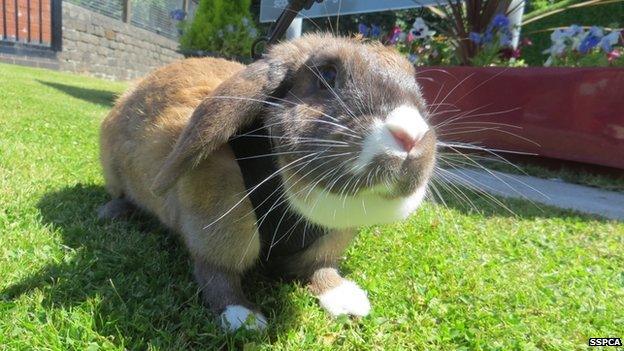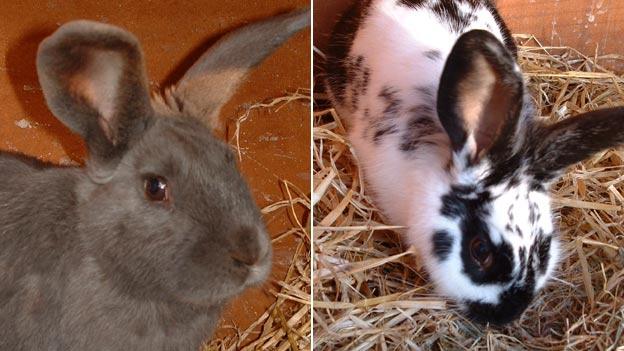Rabbiting on: Study and debate on talking to bunnies
- Published

It is the start of the Scottish SPCA's Rabbit Awareness Week and it comes amid research, debate and discussion on the significance of the pets' interaction with humans.
Sam honks.
This has nothing to do with how the little black and white rabbit smells, but the noise he makes when he is happy.
Sam makes the quiet noises when he gets into his run in the garden, or hears the rustle of a bag of kale being opened, or the voices of his young owners Ella and Grace.
He binkies too, a binky being the darting runs and kung fu-like jumps and kicks bunnies do when they are excited.
Bugs, Sam's large smoky grey hutch-mate, has a different personality.
To get attention he will tug at a sleeve with his teeth, nudge at hands with his nose and, when jealous of the petting Sam is getting, thumps one of his big back feet.
And attention he duly gets, as the girls coo over him while feeding him dandelion leaves foraged from the bottom of the garden.
This kind of interaction between rabbits and humans intrigues scientists.
UK-based James Oxley and Switzerland's Dr Elodie Briefer are working with a professor in Italy to try to better understand the significance of people talking to their pets.
Dr Briefer, an expert on animal behaviour, has an interest in how birds and mammals use vocal signals to send out information about their species, body size, age, dominance status and mood.
In collaboration with Mr Oxley, she has produced a questionnaire for rabbit owners.
Questions include how often do they talk to their pet and the tone they use, for example is it similar to the way people might speak to infants.
Other questions ask whether people have their rabbits with them while they relax in front of the TV, whether they believe talking to rabbits calms them down when they are stressed and how intelligent they think the animals are.
Mr Oxley said: "There is currently very little research which explores the area of human personality and what impact this has on views and interactions - talking and stroking - with companion animals other than dogs.
"Therefore, we decided to attempt to design a brief questionnaire which investigates this in both cats and rabbits."
"We think that research could help understand how people and animal personality may aid in areas such as re-homing cats and rabbits with matching human-animal personalities.
"Understanding human personalities and views may also aid in a stronger human-animal bond."
Re-homing of rabbits is a major issue for the SSPCA and an area of concern being highlighted during the charity's week-long campaign.
Chief Superintendent Mike Flynn said increasing numbers were being given up by people unable, or unwilling, to give them daily care and attention.
The SSPCA currently has more than 100 rabbits waiting to be re-homed.
'Naturally inquisitive'
Mr Flynn said: "There are lots of loving rabbit owners who treat their pets like one of the family and give them all the care and attention they need.
"But sadly this isn't true in all cases."
He added: "The biggest issue is rabbits being put in a hutch and left at the bottom of the garden, with many enduring a life of solitude and boredom.
"Rabbits are highly intelligent, sociable and can make fantastic family pets, though we strongly advise parents that they and not their children need to take responsibility for their welfare."

Buddies Bugs and Sam have different ways of seeking human interaction
Rae Todd, of the Rabbit Welfare Association and Fund (RWAF), said interaction between rabbits and their owners was important, not least because the pets rely on humans for food, shelter and opportunities to exercise.
She said: "Bunnies are naturally inquisitive, so it is best to climb in to the exercise run with them and let them approach you, then give them something they enjoy like a small piece of carrot or a nose rub.
"Remember that rabbits are prey animals and therefore nervous, so they do not enjoy being picked up or held.
"It is always best to interact with them on ground level."
'Cheap and easy'
Rabbits Require Rights wants the pets' welfare to be protected by new laws and has a petition calling on the UK and Scottish governments to introduce the legislation.
The campaign group, which has a rescue centre near Edinburgh, said current legislation and codes of practice offered little protection.
Spokeswoman Karen Gray said five legal welfare requirements of any animal owner were not enforced, or adhered to, by many rabbit owners.
She said: "These relate to diet, housing, freedom to express natural behaviours, to be kept with or apart from other animals suited to their species and protection from illness or injury.
"The fact that rabbits are still viewed and perhaps in many cases promoted as a 'cheap and easy child-friendly pet' does little to improve on understanding into the real needs of rabbits."
She added: "Rabbits are far more complex than many people first realise, they have specific needs that simply aren't being met by the majority of owners, and often through no fault of their own.
"There is much to do to not only improve on the lives of pet rabbits, but to raise public perception, awareness and education into the true needs of these often misunderstood and frequently neglected pets."
Back with Sam and Bugs, the big grey rabbit has hopped off and turned his back to Ella and Grace, his signal that for now he has had his fill of petting and dandelions and wants to be left alone for an afternoon snooze.